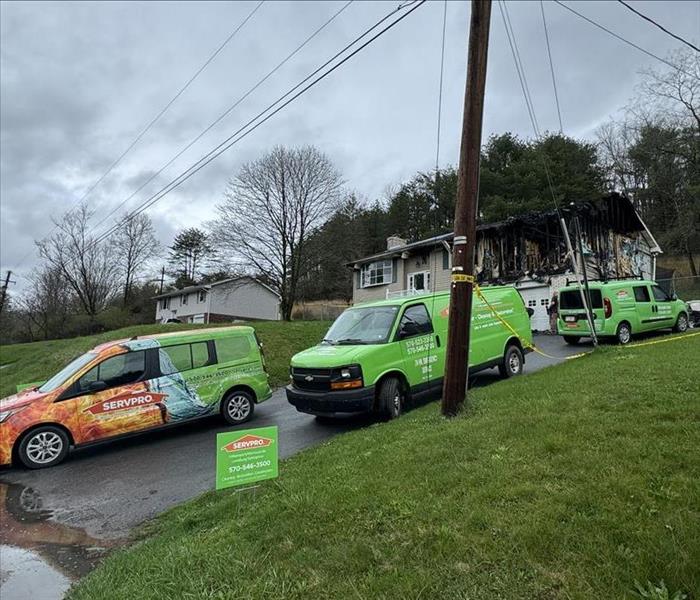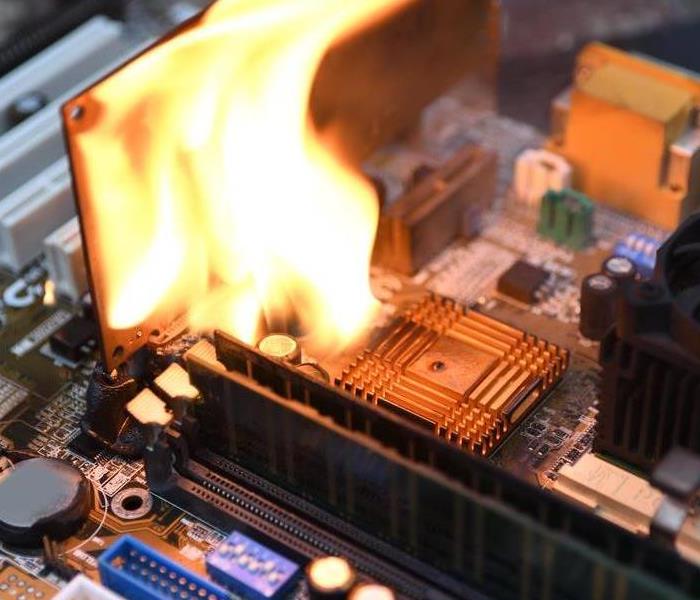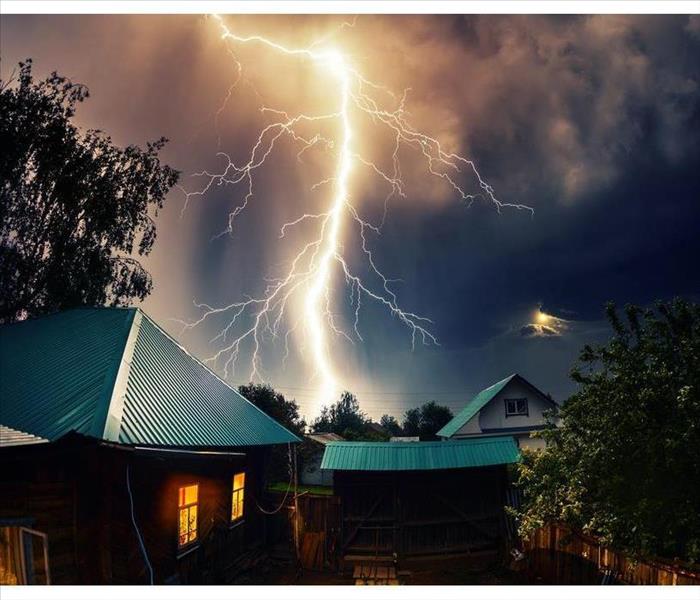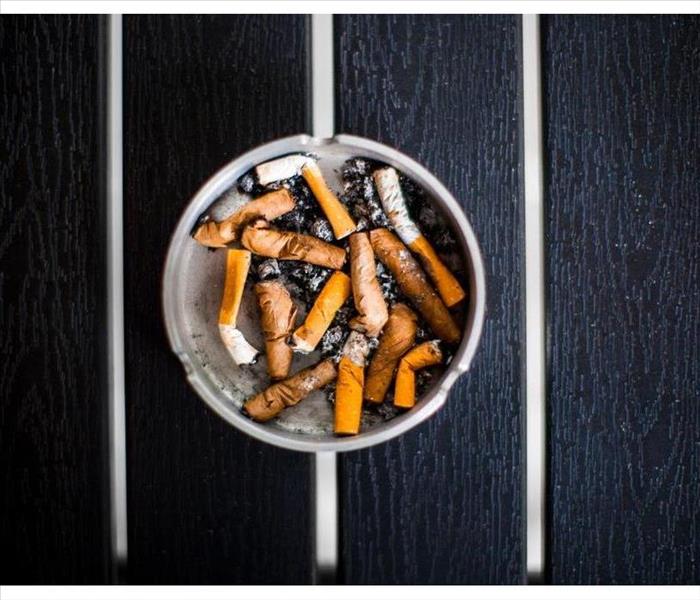Archived Fire Damage Blog Posts
Safeguarding Your Property: Fire Restoration Insights and Prevention Tips
12/17/2024 (Permalink)
 SERVPRO team restoring a residential fire
SERVPRO team restoring a residential fire
Safeguarding Your Property: Fire Restoration Insights and Prevention Tips
This year, our team at SERVPRO® of Williamsport Montoursville and Lewisburg Selinsgrove has worked tirelessly to help dozens of homeowners and business owners recover from the devastating effects of fire. It’s our mission to restore properties and peace of mind after such traumatic events. But as much as we are here to help rebuild, we are even more passionate about helping you prevent fires from happening in the first place.
Lessons Learned from Fire Restoration
Every fire we’ve restored this year has taught us something new about safety, preparedness, and resilience. One thing remains constant: fires are unpredictable and can happen to anyone. The emotional and financial toll of fire damage is immense, but the good news is that many fires are preventable. Taking proactive steps now can make all the difference in keeping your loved ones and property safe.
Are Your Smoke Detectors Ready to Save Lives?
Smoke detectors are your first line of defense against fires. According to safety experts, you should have at least one smoke detector in every bedroom and on every level of your home. However, having the devices isn’t enough; they need to be maintained. Here’s how to ensure your smoke detectors are working properly:
- Test them monthly. Press the test button to ensure the alarm is functioning.
- Replace the batteries twice a year. A good reminder is to do this when you adjust your clocks for daylight saving time.
- Upgrade if necessary. If your smoke detectors are more than 10 years old, replace them to ensure reliability.
Develop and Practice a Family Fire Escape Plan
A fire escape plan can save lives, but only if everyone in your household knows and practices it. Here’s how to create a plan:
- Map out your exits. Identify at least two ways out of every room in your home, typically a door and a window.
- Check your windows. Ensure that all windows can be opened easily and aren’t painted shut or obstructed.
- Designate a meeting spot. Choose a safe location outside your home where everyone can gather.
- Practice regularly. Conduct fire drills with your family at least twice a year. Make sure everyone knows how to open windows and use escape ladders if needed.
- Teach fire safety. Discuss with family members how to stay low to the ground to avoid smoke and how to test doors for heat before opening them.
Protect Your Property and Loved Ones
While we hope you never have to face the aftermath of a fire, we are always here to help if you do. From smoke damage restoration to complete structural rebuilding, [Your Restoration Company Name] is your trusted partner in recovery.
Let’s work together to prevent fires and keep our community safe. Take time this week to check your smoke detectors, review your family escape plan, and ensure your home is as fire-ready as possible. A few minutes of preparation today can save lives and prevent heartache tomorrow.
If you’d like more fire prevention tips or have questions about our fire restoration services, contact us anytime. Together, we can safeguard your home, business, and loved ones.
Recovering After a Home Fire: Crucial Mitigation Steps and the Value of Professional Restoration
11/18/2024 (Permalink)
Recovering After a Home Fire: Crucial Mitigation Steps and the Value of SERVPRO® Professional Restoration
Experiencing a home fire is a traumatic event, often leaving homeowners feeling overwhelmed by the physical and emotional aftermath. Knowing the key steps to take immediately after the fire can significantly impact the speed and success of recovery. One of the most critical decisions during this process is choosing a professional restoration company, especially one experienced in navigating insurance claims. Here's why.
Immediate Steps After a Fire
Ensure Safety First
Once the fire is extinguished, ensure everyone is safe and accounted for. Avoid entering the property until the fire department deems it safe to do so. Structural damage or lingering hazards, such as smoke and ash, can pose significant risks.
Contact Your Insurance Company
Notify your insurance provider as soon as possible. Initiating a claim early helps streamline the process of assessing damages and arranging for coverage.
Document the Damage
If it's safe to enter your home, take photographs and videos of the affected areas to document the damage. This documentation is essential for insurance claims and helps ensure proper compensation for losses.
Prevent Further Damage
Fires can leave properties vulnerable to secondary damages such as water intrusion (from firefighting efforts) and mold growth. Tarping roofs, sealing windows, and removing standing water are essential measures to prevent further harm to your home.
The Role of Professional Restoration Companies
While it may be tempting to tackle some tasks on your own, working with a professional restoration company offers several key benefits:
Specialized Expertise
Fire damage isn’t just about burnt walls and furniture—it includes hidden issues like smoke odors, soot residue, and water damage. Restoration professionals use advanced equipment and techniques to address these problems comprehensively, ensuring a safe and thorough cleanup.
Efficient Recovery
Time is critical when dealing with fire damage. Restoration companies can rapidly assess the situation and deploy resources to mitigate the effects of the fire, reducing the risk of further structural or environmental damage.
Insurance Coordination
Dealing with insurance claims can be daunting. Professional restoration companies experienced in insurance coordination act as advocates for homeowners, ensuring all necessary documentation is submitted and claims are processed efficiently. Their familiarity with insurance policies can also help identify additional coverage opportunities, potentially reducing out-of-pocket expenses.
Stress Reduction
The aftermath of a fire can be emotionally draining. Having a trusted team manage the restoration process allows homeowners to focus on personal recovery and rebuilding their lives.
Why Expertise Matters
Choosing SERVPRO with proven expertise ensures your home is restored to its pre-fire condition with minimal complications. These professionals know how to handle both the technical aspects of restoration and the bureaucratic challenges of insurance claims, providing peace of mind during a stressful time.
In conclusion, after a home fire, every decision matters. Prompt action, coupled with the support of an experienced restoration company, can make the recovery process smoother, faster, and less stressful. Prioritize safety, act swiftly, and trust the professionals to help rebuild your home and your sense of security.
Ensuring Safety: The Importance of Fire Drills in Schools and Public Buildings
11/21/2023 (Permalink)
Fire safety is a critical aspect of ensuring the well-being of individuals in schools and public buildings. Fire drills play a vital role in preparing students, staff, and visitors for emergency situations, and their importance cannot be overstated. In this blog, we will discuss the significance of fire drills in schools and public buildings and highlight how these drills contribute to creating safer environments.
Promoting Preparedness
Fire drills provide an opportunity for students, staff, and visitors to practice and familiarize themselves with the necessary actions to take in the event of a fire. By conducting regular drills, individuals gain a deeper understanding of evacuation routes, assembly points, and emergency procedures. This knowledge fosters preparedness and empowers people to respond effectively and calmly during an actual emergency.
Raising Awareness
Fire drills serve as an educational tool, raising awareness about fire safety and prevention. Participants become more knowledgeable about fire extinguishers, fire alarms, and other safety equipment, as well as how to identify potential fire hazards in their surroundings. By actively engaging in fire drills, individuals develop a heightened sense of responsibility to maintain a fire-safe environment.
Testing Evacuation Plans
A properly executed fire drill allows educational institutions and public buildings to assess the effectiveness of their evacuation plans. It provides an opportunity to identify any potential flaws or bottlenecks in the evacuation process and make necessary adjustments. Regular drills also allow for the evaluation of staff and student response times, ensuring that evacuation procedures can be carried out swiftly and efficiently.
Building Confidence
Fire drills help alleviate anxiety and fear associated with emergencies by building confidence in individuals. Familiarity with the evacuation process and knowing what steps to take in a fire emergency empowers participants to remain calm, make rational decisions, and assist others during a crisis. This confidence significantly contributes to their overall safety and well-being.
Reinforcing Safety Protocols
Fire drills reinforce safety protocols and emphasize the importance of following established procedures. This includes ensuring that individuals understand the significance of not using elevators during a fire, closing doors to prevent fire spread, and reporting emergencies promptly. Regular drills serve as reminders of these critical protocols, making them second nature rather than a panicky response during an actual fire event.
Collaborative Learning Experience
Fire drills create a collaborative learning experience, allowing schools and public buildings to gather feedback from participants. This feedback can lead to improvements in evacuation plans, signage, or communication systems, further enhancing overall safety. In addition, fire drills provide an opportunity for individuals to share their experiences, ask questions, and enhance their understanding of fire safety practices.
In conclusion, fire drills in schools and public buildings are essential for ensuring the safety and well-being of everyone present. They promote preparedness, raise awareness about fire safety, and allow for the assessment and refinement of evacuation protocols. By actively conducting fire drills, educational institutions and public buildings can instill a culture of safety, empower individuals to respond effectively during emergencies, and ultimately create a secure environment for all.
The Cost of Fire Damage: How Much Revenue Can You Lose and How to Recover
4/10/2023 (Permalink)
 If your electronics have suffered a fire loss, give SERVPRO a call today.
If your electronics have suffered a fire loss, give SERVPRO a call today.
Electronics are a major part of our lives, and they can be destroyed by fire. If you've experienced a fire in your home or business, it's important to know that electronics will likely be damaged. If they aren't cleaned properly, they could cause further problems down the road.
What happens if they aren't cleaned?
Electronics can become damaged when exposed to heat, smoke and ash residue during a fire event. This damage can result in short-circuiting or other issues that could lead to further problems with your devices later on. It's best to clean them immediately after exposure so that their performance doesn't suffer from these effects later on.
Types of Damage Caused by Fire
There are three main types of damage that can occur in a fire: smoke damage, soot damage, and water damage.
Smoke Damage - When you think about the effects of smoke on electronics after a fire, it's easy to imagine that all the smoke will just blow away with the wind once the flames have been extinguished. Unfortunately for your devices this isn't quite true--in fact there are many ways that even small amounts of residual smoke can cause lasting harm to your electronics. The most common way this happens is through condensation within internal components, as temperatures cool down and humidity rises during cleanup efforts following an incident like this one.
Why Cleaning Electronics is Necessary
Cleaning your electronics after a fire is necessary to prevent further damage to the device. When smoke and soot are left on electronic equipment, they can cause corrosion that will damage components and make them unusable.
Cleaners are available for every type of electronic device; however, professional cleaning services provide the best results because they have specialized equipment designed specifically for each type of product (such as televisions or computers). These cleaners know how best to clean each individual model based on its construction materials and specifications--and they know how long it takes for certain parts inside an item's casing before they become damaged by heat exposure during a fire event!
Types of Cleaning Services Available
There are many types of cleaning services available, and each one can be used for different purposes. Exterior and interior cleaning is the most common type of service and includes cleaning your device's body, screens and buttons. Deodorization is another option that helps remove smoke odors from electronics so they smell fresh again. Data recovery services can be used to retrieve any important files that were lost during a fire or other disaster.
Cost of Cleaning Services
The cost of cleaning your electronics depends on the type of service you need and the size of your item. If you're looking for a simple wipe down, it will be less than if you need major repairs or replacement parts. The extent of damage is also a factor in determining how much a repair will cost.
If you're interested in learning more about our services, please feel free to contact us! We'd love to hear from you and help answer any questions that come up during this process.
Cleanup services are available for both residential and commercial customers, so you can rest assured that your devices will be taken care of in the best way possible. Give SERVPRO a call today.
Cooking Grease: Trash It, Never Drain It
8/27/2022 (Permalink)
Cooking Grease
Bacon is a breakfast staple in many households across the country. When cooking bacon in a skillet, a lot of grease can form. While pouring this grease down the drain may seem like a good idea, it can result in a drain clog and issues in the sewer system. The best practice is to throw it away. However, there are some steps you must take to toss your cooking oil out safely.
1. Cool Grease to Prevent a Fire
If you try to pour your grease into a container or the garbage while it is still hot, it can cause burns to your skin or cause a fire in your trash can. It is very important to allow the grease to cool slightly. You want it to be warm enough to flow easily, but not so hot that it is a danger to yourself or your house.
2. Pour Grease to Prevent a Mess
If you pour your grease down the sink and get a drain clog, then it will be a much bigger mess than you were expecting. The trash is the best place to pour the cooking oil, but make sure that you empty it into a plastic or metal container with a lid before placing it into your garbage bin. Since you have allowed the grease to cool, it won't melt your container. Be sure to allow it to finish cooling once you have transferred it into the chosen receptacle.
3. Throw Grease to Prevent a Sink Clog
Once your grease is done completely cooling, make sure to throw it into the garbage. Dumping oily items down your sink can cause build-up. Oftentimes when a clog gets cleared, homeowners have found grease in drain pipes. It's important to not allow cooking oils to enter your drain systems at all.
Dealing with damage caused by a drain clog in Sunbury, PA, can be a frustrating experience. The best option is to never allow grease to go into your drains. If you do ever find yourself with water damage from clogs, contact a professional cleanup and restoration specialist.
Lightning Safety Tips
8/27/2022 (Permalink)
 Protecting your home in Shamokin, PA, from fire requires a certain amount of vigilance.
Protecting your home in Shamokin, PA, from fire requires a certain amount of vigilance.
Protect Your Home From Lightning Fire
Protecting your home in Shamokin, PA, from fire requires a certain amount of vigilance. During storm season, the risk is higher due to an increased number of thunderstorms. The good news is that there are several things you can do to protect your home from a lightning fire and keep your family safe.
Prime Strike Times
While a strike can occur any time certain atmospheric conditions are present, there are specific times you should be especially mindful:
- During summer months
- Afternoon and early evening
- Prime thunderstorm season for your region
In areas with prolonged rainy seasons, lightning strikes may be more common. Stay weather aware, and consider adding upgrades to your home that make it less susceptible to fire damage during a storm.
House Fire Risk
You can't really control where a strike happens, but there are certain measures you can take before and after a storm to reduce the chance of a lightning fire. If you believe your house was struck during a thunderstorm, fire restoration specialists can assess your property to check for damage. A whole-house surge protector can be installed on your electrical panel to protect your outlets and anything plugged into them. Something as simple as unplugging electronics when you know a storm is on its way can be helpful, too.
Personal Safety Strategies
You should always seek a sturdy shelter during a thunderstorm. No place outside leaves you safe from a strike. Even inside your home, it's a good idea to stay away from using corded devices or anything attached to a plumbing line, as both can transfer electric charges from outside directly to you.
While there are many precautions you can take against a lightning fire in your home, there's no substitute for astute attention. If a strike sounds like it lands anywhere nearby, have your home checked for damage as soon as possible.
Tips for Preventing a Cigarette Fire in Your Home
8/27/2022 (Permalink)
 Use an ashtray to extinguish cigarettes
Use an ashtray to extinguish cigarettes
Advice on Preventing a Home Fire Caused by Cigarettes
A fire that occurs at your home in Milton, PA, can have long-term consequences and lead to significant losses. Sometimes, the cause is faulty wiring or an unpredictable event. However, a cigarette fire is avoidable if you follow these tips.
Eliminate the Risk of a Cigarette Fire by Smoking Outside
Smoking indoors increases the risk of fire and leads to other issues, including:
- Stubborn smoke odors in fabrics
- Discoloration of walls and ceilings
- Air contamination
When smoke and ash compromise a home's interior, a smoke restoration service must employ powerful techniques to address the damage. Therefore, smoking outside can help you avoid unpleasant and lingering stains and odors inside your home while reducing devastating fire risk.
Use an Ashtray To Extinguish Cigarettes
Many home fires happen because smokers carelessly use floors and other flammable surfaces to put out their cigarettes. Using an ashtray to extinguish a cigarette and catch ashes can go a long way toward preventing residential fires. However, leaving a burning cigarette unattended can still cause an ashtray fire.
Never Smoke in Bed
Smoking in bed remains one of the leading causes of house fires and should never be an option. Accidentally dropping a cigarette while falling asleep can cause it to ignite flammable textiles and furniture, causing a fire that spreads within minutes.
Avoid Throwing Cigarettes on Exterior Vegetation
The landscape around your home may include trees, bushes, and flowers with thin or thick branches. They are highly flammable when they come in contact with a cigarette. The flames can quickly travel to your home's exterior structure and work their way inside, where they can destroy its contents.
Never Smoke Near Medical Oxygen
Smoking in a home where someone uses medical oxygen can lead to a fire that burns faster than other types. Fire cleanup measures may not be sufficient to recover from the damage medical oxygen fires cause.
A cigarette fire is avoidable when you take precautions while smoking, but this type of fire is still the most common cause of residential fire damage in Milton, PA.
Dryer Vent Preventative Tips
4/11/2022 (Permalink)
There are many things that can cause damage ro your home. As a homeowner or business owner, it is imperative that you are aware of, and perform, the preventative maintenances that help keep your property safe. One of the lesser known maintenances is to keep your dryer vents lint free. Here are some tips to keep your dryer working efficiently and to reduce your risk of a lint fire:
- Regular Dryer Maintenance- Make sure that you clean your dyer's lint filter after every use. Quarterly you should clean out any built-up lint where the filter is housed and as well from your dryer into your vent pipe.
- Outside Dryer Vent- Remove the cover over the access to where your dryer vent is piped outside. Check that the cover is free of debris, and clean inside the exhaust to ensure that there are no nests or lint build up.
- Pay Attention to Warnings From Your Appliance- Any unusual noises or smells, as well as longer than usual drying times, need to be handled handled by a professional repair person that is qualified for your specific appliance.
Call SERVPRO of Lewisburg/Selinsgrove for your dryer vent cleaning today!
SERVPRO of Lewisburg/Selinsgrove Busy with Fire Calls!
1/22/2022 (Permalink)
Fires in homes are one of the leading calls we get from customers this time of year. The Red Cross has made this information available in order to hopefully prevent this from happening. See some important facts below:
When do home fires happen?
Home fires can happen at any time, but they generally increase during the fall and winter, with December and January being the peak months. Home fires are also more common on Saturday and Sunday, and tend to peak between 6:00 and 7:00 PM.
Where are home fires most likely to start?
Home fires are more likely to start in the kitchen than any other room in the home. The second leading cause of home fires are heating sources like wood stoves, and fireplaces. Fires caused by smoking are the leading cause of deaths.
Who are affected by home fires?
Home fires don’t discriminate and can affect any home at any time. However, children under five and adults over 65 face the highest risk of dying in a home fire
Find more information here: Red Cross Fire FAQs.
If you or someone you know experiences a fire in your home, call SERVPRO of Lewisburg/Selinsgrove so we can help you!





 24/7 Emergency Service
24/7 Emergency Service


